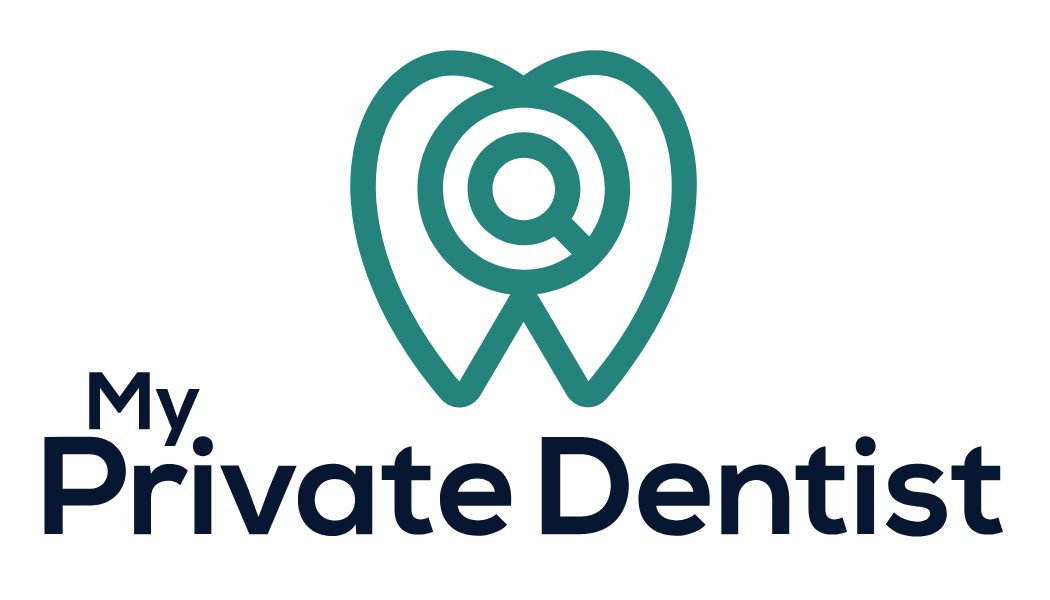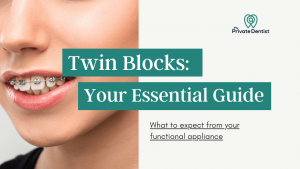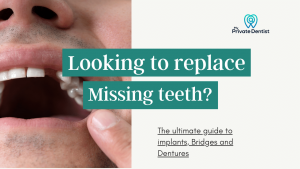These are my recommendations for the best denture cleaners 2024.
If you’re looking to improve your denture hygiene game, you’ve come to the right place. As a dentist, I’ve researched and tested various denture cleaners to bring you the best recommendations.
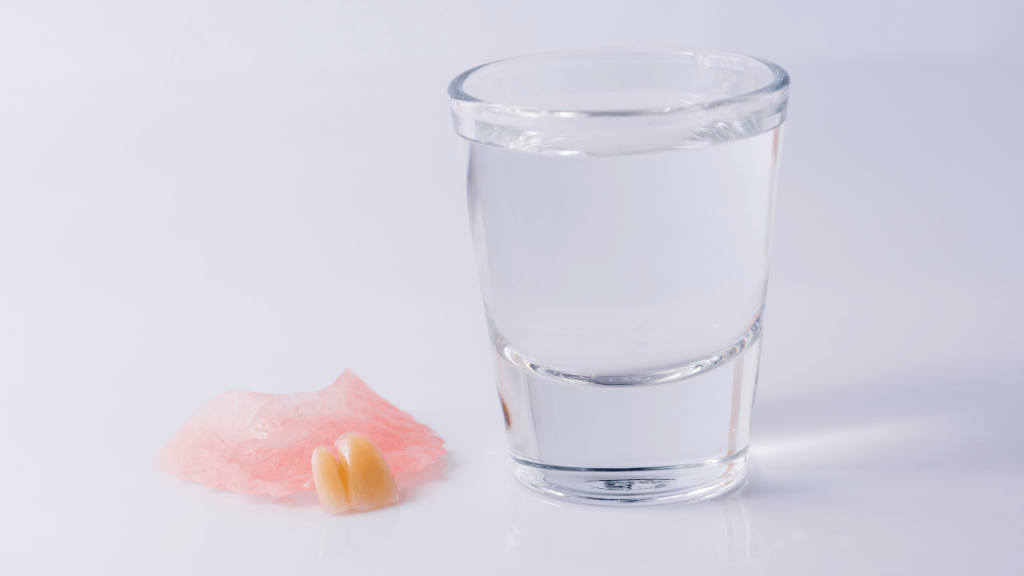
With so many products on the market, it can be overwhelming to choose the right one. But fear not, I’ve narrowed it down to the top contender: Polident Overnight Whitening Effervescent Tablets. This all-in-one cleaner effectively removes food, plaque, and reduces odours. Plus, it leaves your mouth feeling minty fresh.
But what makes a good denture cleaner? I’ll guide you through the key features to look out for and help you decide if an ultrasonic machine is right for you.
Don’t settle for subpar denture hygiene. Check out my full list of top denture cleaners to find the perfect fit for your needs.
The best denture cleaners – as recommended by dentists
Why trust us? After helping thousands of patients over the last 10 years, we know what works. We can tell you what the gimmicks are, so you can maintain your oral health for the best value for money.
We’ve carefully put together a list of denture cleaners, which we feel will help prevent you having dental problems in the long term. The less problems for patients, the happier we are as dentists.
Our Top 7 picks
Best Overall Denture Cleaner – Polident Overnight Whitening Tablets
Best Ultrasonic Denture Cleaner – Hangsun Ultrasonic Denture Cleaner
Best Quick Cleaner – Polident 3-minute Tablets
Best Denture Cleaner for Stain removal – Stain Away Plus
Best Denture Cleaning Paste – Dentu-Creme
Best Cleaner for Flexible Dentures – FDC
Best Value for Money Denture Cleaner – Y-Kelin Denture Cleaning Tablets
Best Overall Denture Cleaner
Polident Overnight Whitening Antibacterial Denture Cleanser
Why do our dentists recommend this denture cleaner?
Effervescent tablets are the clear winner when it comes to ease of use for denture cleaning. Simply leave your dentures in the solution overnight, and it will effectively kill microorganisms that can lead to thrush or gum problems (1). This solution is suitable for all types of dentures.
Patients love the taste after use, which is not too overpowering or chemical. The secret to its success lies in its four active ingredients that work together to clean those hard-to-reach areas.
For the ultimate clean, consider pairing effervescent tablets with an ultrasonic cleaner. You’ll get the benefits of both methods, leaving your dentures sparkling clean and fresh.
Pros
✅ Simple and easy to use
✅ No measuring
Cons
❌ Needs to be used overnight
❌ Not really whitening, maintains colour
Best Ultrasonic Denture Cleaner
Hangsun Ultrasonic UV Cleaner
Why do our dentists recommend this denture cleaner?
In dental practices, we rely on ultrasonic cleaners as the first stage in cleaning our instruments. These powerful machines use high-frequency vibrations to dislodge any loose particles and debris.
You can get the same benefits for your dentures. The ultrasonic cleaner uses microbubbles to clean all types of dentures effectively. The cycle lasts just 5 minutes, ensuring that even the most hard-to-reach crevices are cleaned thoroughly. Plus, the built-in UV light kills microorganisms for added hygiene.
Consider pairing the ultrasonic cleaners with an effervescent tablet for the best clean.
Pros
✅ Can be used with tap water
Cons
❌ Expensive to buy
❌ Needs to be plugged in
Best Quick Denture Cleaner
Polident 3 Minute Daily Cleanser
Why do our dentists recommend this denture cleaner?
While we typically recommend leaving dentures out overnight for optimal hygiene, we understand that some patients prefer not to be seen without them.
If you’re short on time, a 3-minute tablet can provide an effective clean that kills bacteria and leaves your denture feeling fresh again. This quick solution is perfect for those on-the-go days when you need a fast and easy solution.
However, we do recommend leaving your dentures out overnight at least once a week to ensure a deep clean and prevent any potential oral health issues.
Pros
✅ Easy to use tablets
✅ Less likely to cause fade of denture acrylic colour
Cons
❌ Does not have the same stain removal effect as the whitening tablets
Best Denture Cleaner for Stain removal
Stain Away Plus Denture Cleaner
Why do our dentists recommend this denture cleaner?
If you’re a frequent tea, coffee, or red wine drinker, you may notice that your dentures become stained over time.
This powerful solution contains sodium bicarbonate and citric acid, which work together to dissolve stain particles in a gentle but effective way. Not only does it remove stains, but it also leaves a refreshing peppermint taste.
Many patients have been happy with their results, with some even stating that their dentures look like new after use(!).
Pros
✅ Specialised formula for stain removal
Cons
❌ Needs to be measured out
❌ More expensive per use
Best Denture Cleaning Paste
Dentu-Creme Economy
Why do our dentists recommend this denture cleaner?
While toothpaste may seem like a convenient solution for cleaning your dentures, it can actually do more harm than good. Toothpaste is often too abrasive, which can roughen the surface of your denture and make it more prone to future staining. Additionally, toothpaste may contain ingredients that can damage your denture over time.
Instead, we recommend using a specially formulated denture paste. Dentu-Creme is designed with a mild abrasive that effectively cleans your dentures without causing damage. For best results, use a soft denture brush instead of your regular toothbrush, which may wear out more quickly if used for both teeth and dentures.
Pros
✅ Can give the dentures a good scrub
Cons
❌ Not as effective at reaching all crevices as tablets in an ultrasonic bath
Best Cleaner for Flexible Dentures
FDC Flexible Denture Cleaner
Why do our dentists recommend this denture cleaner?
Flexible dentures require a higher level of maintenance as they are prone to picking up stains and can easily warp when exposed to hot water. To keep your flexible denture in top shape, we recommend using FDC once a week.
In addition to regular cleaning, it’s important to use a soft brush to remove food particles quickly. This helps prevent stains from penetrating into the soft material and causing discoloration.
By following these simple maintenance tips, you can ensure that your flexible denture stays looking its best.
Pros
✅ Specific for Flexible Dentures
Cons
❌ Costs more than generic cleaners
Best Value Denture Cleaner
Y-Kelin Denture Cleansing Tablets
Why do our dentists recommend this denture cleaner?
While we typically recommend branded denture cleaners, we understand that some patients may be looking for a more cost-effective alternative.
While this particular denture cleaner may not be as highly rated as some of the branded options, it can still provide a good alternative for those on a budget. However, it’s worth noting that the mixed reviews on flavour and aftertaste may not make it the best choice for everyone.
Pros
✅ Cost (30% less than branded tablets)
Cons
❌ Blue colour can be off putting
❌ Taste not as good as others
Buying guide
When it comes to finding the best denture cleaner, there are several factors to consider. Here’s a buying guide that can help you make an informed decision:
Types of denture cleaner
Effervescent Tablets: The most popular type of denture cleaner. These are combined with water, and your dentures are placed in the solution. They are easy to use, effective and can be used daily.
The tablet reacts once in water to let off bubbles, which help to knock off food debris, and break down stains. Some work in under 5 minutes, while others require the denture to be soaked overnight.
Denture Powders/Liquid: They both work in a similar way to denture tablets but require the product to be added to water, mixed and then the denture left in overnight. It’s similar to how a descaler works.
Denture Paste: Similar to toothpaste but with ingredients more suited to extra oral use. Better for patients who prefer to give their denture a good scrub.
It’s best to use them with a soft brush, and help the mild abrasive remove plaque and calculus from the denture. Should not be overzealous when cleaning as it can take away the smooth surface, leading to porosities which can further harbour stains and bacteria.
Ultrasonic Baths: These are mechanical containers which vibrate at a very high frequency, moving the solution they contain, to help clean the denture. They can be used in conjunction with the above cleansing liquids or tablets to give a two pronged clean.
Ultrasonics are used to remove plaque, calculus and heavy stains from the surfaces, without damaging any metalwork.
Pricing
The most common price of effervescent tablets seems to be around £0.10 per tablet. When using this daily for a month, £3 a month seems a reasonable expense in order to make sure your denture is kept clean and healthy. Less well-known brands can be cheaper.
The ultrasonic baths are nice to have but not exactly a necessity. There is obviously the initial outlay, but if you get a few years out of the product and use it daily this again can be worth the expense.
Ingredients
Cleansing Agents: There are some common and effective ingredients to look out for.
Sodium Bicarbonate and Citric Acid are general cleaning agents which help to produce the bubbles which soften plaque.
Sodium Carbonate Peroxide activates hydrogen peroxide which is a mild bleach to help kill bacteria. We use hydrogen peroxide in tooth whitening procedures.
Tetraacetylethylenediamine (TEAD) produces peracetic acid for cleaning, and Sodium Lauryl Sulphate (SLS) helps loosen calculus and breaks apart plaque matrix.
Allergens: Always check the ingredients prior to purchasing a product. Some people are allergic to sodium lauryl sulphate (SLS) which can cause redness and irritation to their oral mucosa. It’s best to try a small pack or sample pack before purchasing a bulk amount.
Convenience
The effervescent tablets are the most convenient by far, especially when travelling, as they are individually packed. Going on holiday for two weeks? Pack 14 to go. Any cup in a hotel bathroom, one tablet , put in your denture and you’re good to go. No measuring needed as with liquids and powders.
Although the ultrasonic baths are convenient to use at home, they do not necessarily need to be taken with you.
It’s better to clean your dentures daily rather than weekly, as studies have shown this helps to reduce the amount of bacteria and fungus that can grow on your dentures.
What kind of denture do you have?
With any dentures, cleaning them gently and regularly is the best way of making sure your denture stays looking and feeling their best. As heavy stain or calculus builds up, aggressively trying to remove this can damage the denture.
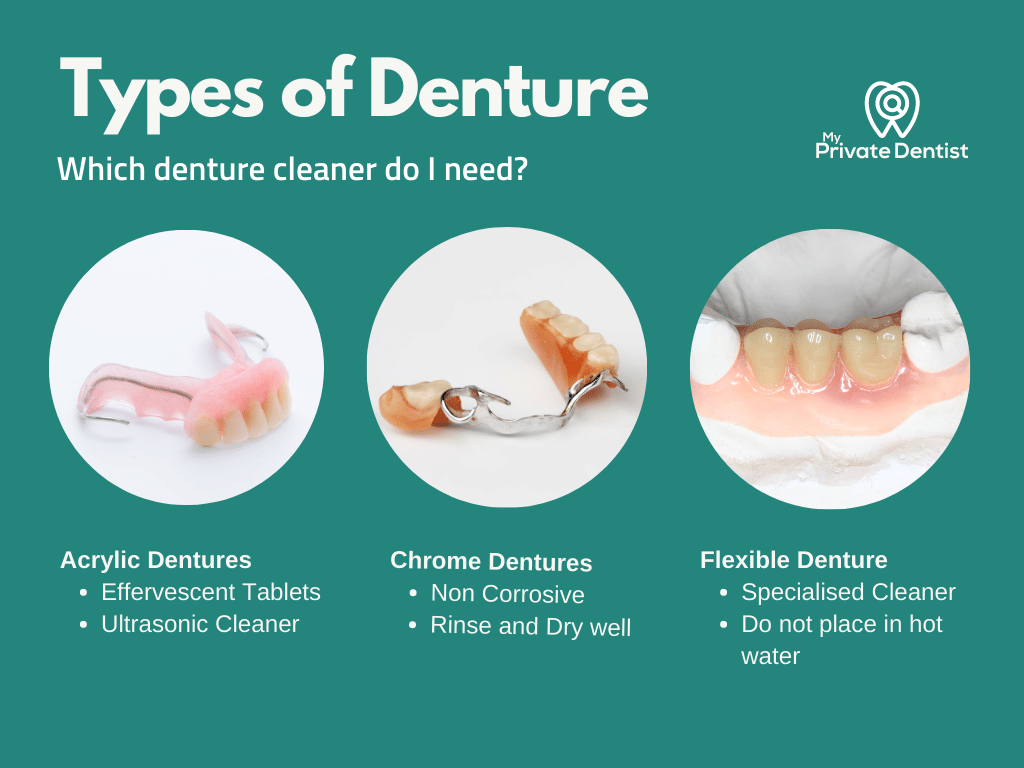
Acrylic: The most common type of denture, especially if you have full dentures. The plastic acrylic material is relatively hard wearing, but can be prone to staining.
Interestingly, the most common areas when the denture gets calculus build up, is on either sides of the molars on an upper denture, and around the lower incisors on a lower denture. This is because this is where our salivary glands are situated.
The calcium in saliva hardens and settles on the denture surface. This can then harbour bacteria can cause a foul odour. Scrubbing or ultrasonic baths can remove some build up but for stubborn deposits, you may need to see your dentist to remove it.
You need to make sure you’re not damaging or scratching the acrylic as this will make your denture more prone to staining.
Valplast: If your denture is made from a flexible material, this is most likely to be valplast. These dentures require a special cleaner, which does not distort the fit of the denture. Short acting cleaners are better.
Metalwork on Dentures: It’s best to read whether a denture with metallic elements is compatible with the denture cleaning products. You need to make sure they don’t cause corrosion . It’s important to dry your denture thoroughly once cleaned to prevent issues≥
Removable: It may be obvious to most, but fixed dentures or implants which cannot be removed from your mouth need to be brushed with regular toothpaste. These denture cleaners are for extra oral use only and should not be used with the denture still in your mouth.
Dental Problems
Bacteria and fungi can cause irritation, bad odours and denture stomatitis
Thrush: Caused by a fungus called candida albicans, thrush in your mouth can be sore and difficult to shift. Although thrush on your tongue can look like a whitish coating, on the roof of your mouth it makes your soft palate red, raw and painful under the denture.
To prevent thrush, using a denture cleaner helps kill any fungus that may be present on the denture surface, stopping it from getting worse. I also recommend leaving the denture out for a few hours a day for at least a week to help let the affected area recover.
Periodontal disease: Bacteria present in plaque causes gingivitis, or the inflammation or bleeding of gums. This can lead to gum disease. If you wear a denture and have natural teeth, not only do you need to brush well, you need to make sure all plaque is removed from your denture as well.
You need to concentrate especially on the areas where your denture teeth meet your natural teeth. Neglecting this cleaning can lead to further tooth loss.
Irritation: If you’re getting food stuck under your denture regularly, and this is causing soreness, it’s best to see a dentist to check the fit of your dentures. You gums can change shape over time, and an ill fitting denture can cause issues.
A dentist may be able to reline the fit surface of your denture, or make you a new one which fits well.
How to clean your denture
Here are the steps to clean dentures:
- Rinse: Begin by rinsing your dentures under running water to remove any loose debris or food particles.
- Clean: Apply a small amount of denture cleaner to a soft-bristled toothbrush or denture brush. Gently brush all surfaces of the dentures, including the teeth, gums, and any crevices or hard-to-reach areas. Be careful not to scrub too hard, as this can cause damage to the dentures.
- Rinse Again: After brushing, rinse the dentures thoroughly under running water to remove any remaining cleaner or debris.
- Soak: Place the dentures in a denture cleaning solution or water and let them soak for the recommended amount of time. This helps to remove any remaining stains or bacteria that may have been missed during brushing. If you have an ultrasonic bath you can also place them in this for 3-5 mins.
- Rinse Again: After soaking, rinse the dentures thoroughly under running water to remove any remaining cleaning solution.
- Brush Your Teeth/Mouth: Use a soft-bristled toothbrush or gauze to gently brush your gums, tongue, and any remaining natural teeth. This helps to remove any bacteria or debris that may have accumulated in your mouth.
- Store: Store your dentures in a clean, dry place when not in use. Avoid using hot water or leaving them in direct sunlight, as this can cause warping or damage to the dentures.
By following these steps, you can keep your dentures clean and in good condition for longer. It’s important to clean your dentures regularly to prevent bacteria buildup, bad breath, and other oral health problems.
Top tips for looking after dentures
- Avoid using harsh chemicals and bleach to clean your dentures, as they can be dangerous and may scratch or make your dentures more porous.
- Schedule regular check-ups with your dentist to ensure that your dentures fit properly and are in good condition.
- Use a soft-bristled toothbrush or denture brush to clean your dentures, and be gentle to avoid damaging them.
- Soak your dentures in a denture cleaning solution or water as recommended, and rinse thoroughly afterwards.
- Avoid using hot or boiling water to clean or soak your dentures, as this can cause warping or damage to the dentures.
Frequently Asked Questions:
What are the benefits of using a denture cleaner?
Using a denture cleaner helps to remove bacteria, food particles, and stains that can accumulate on your dentures over time. This helps to prevent bad breath, gum irritation, and other oral health problems.
How often should I use a denture cleaner?
It’s recommended to clean your dentures at least once a day, preferably after meals. Regular cleaning helps to prevent bacteria buildup and keep your dentures in good condition. The longer the denture is left uncleaned, the more stubborn the stains can become.
Can I use my toothbrush to clean a denture?
Yes, you can use a soft-bristled toothbrush or denture brush to clean your dentures. However, avoid using regular toothpaste, as it can be too abrasive and may damage your dentures.
Can you soak in mouthwash?
You should soak your dentures in a denture cleaning solution or water. Avoid using mouthwash, as it may contain alcohol or other ingredients that can damage your dentures.
What if the denture cleaners don’t work?
If your denture cleaner doesn’t seem to be working, try using a different type or brand of cleaner. If you’re still having problems, schedule a check-up with your dentist, who may be able to clean them professionally, send them to a lab for refurbishment, or discuss making you new dentures.
Our Verdict
Taking care of your dentures is important for maintaining good oral health and preventing problems such as bad breath and gum irritation. Using Polident Effervescent Overnight Whitening Tablets can help to remove bacteria, food particles, and stains from your dentures.
It’s important to clean your dentures regularly, preferably after meals, and to avoid using harsh chemicals or hot water that can damage your dentures.
By following these tips and seeking professional help if needed, you can keep your dentures healthier, and looking their best for longer.
